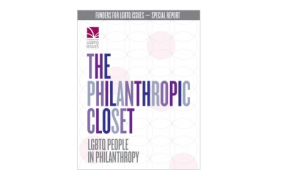Henry Suhrke is being remembered as an early pioneer in charitable law and fundraising regulation who also founded Philanthropy Monthly, one of the first publications to focus on the sector.
It has been learned that Suhrke died July 25 at age 83 in Palm Harbor, Fla., where he moved last year.
Bruce Hopkins, a partner in Polsinelli, Shalton, Flanigan, Suelthaus in Kansas City, Mo., contributed articles to Philanthropy Monthly over the years. “When I first started a practice, the nonprofit field — and the entire sector for that matter – was hardly what it is today. Today the sector is full of lawyers, accountants and professionals that service nonprofits. Back then, there were not that many,” Hopkins said.
Suhrke started Philanthropy Monthly in 1969, the same year the Tax Reform Act was passed which essentially wrote many of the laws about charitable and planned giving that exist today. “It was the beginning of the modern nonprofit sector and certainly the law aspects of it, because before 1969 there just wasn’t much law,” Hopkins said.
“It was a pretty barren field” prior to 1969, Hopkins said, with only some lawyers working with associations and higher education. “It just wasn’t much of a community back then. I didn’t fully realize all this because I was just a brand new lawyer and didn’t have the perspective,” he said. “I think back on those days and how few people there were that were toiling away as consultants in the nonprofit area and he was one of the first.”
After the 1969 act was passed, the nonprofit field “went crazy with conferences because there were so many out there who were clueless really to what happened,” Hopkins said.
“Our industry has lost a truly gentle person for whom philanthropy was about personally giving of himself to help others. I hope, while he can never be replaced, that the next generation of volunteers will measure up to the leadership he showed throughout his life,” said Geoffrey Peters, president of Creative Direct Response in Bowie, Md., and pro bono counsel to American Charities for Reasonable Fundraising Regulation.
Peters called Suhrke “a true gentleman in the classic sense of that word and more than that was a great friend of philanthropy not only in the United States but around the world.”
Philanthropy Monthly “provided a forum for both investigative reporting and editorializing and for thoughtful discourse and debate within the industry,” Peters said. “I clearly recall meetings in New York at his annual conference where lawyers, accountants and fundraisers who serve the industry would meet to learn from each other and discuss changes in charitable regulation and accounting,” he said.
Peters credits those early conferences with establishing professional relationships that continue today with fellow attorneys like Hopkins, Seth Perlman and Errol Copelivitz. “Much of my own personal involvement in those issues, and that of many others, stems from those meetings,” he said.
Suhrke testified before committees considering regulation of charities, aided charity regulators from other countries to develop their oversight plans, Peters said, and was “always generous with his time helping those new to the sector understand the complexities and the burdens of charity regulation and financial accountability.”
Philanthropy Monthly was “the primary source of substantive discourse on issues both legal and sociological impacting the philanthropic sector,” said Seth Perlman, a partner in Perlman and Perlman in New York City.
In one of the last references to Philanthropy Monthly found on the Internet, Suhrke talked about his preference for print over Internet publication when it came to integrating the Web. “In a print versus a Web publication there is an opportunity to be more thoughtful – and that’s the route I’d rather pursue,” he told Foundation News and Commentary (FNC&C) for the November/December 2002 edition.
“I’m not against electronic publishing. Some will want the Web, while some will still want to take a magazine and sit by a fireplace to think over the information in a way the Web medium doesn’t foster,” Suhrke wrote. “Young people are perhaps more prone to Internet use — though there are many older people who also use it — but they also haven’t stopped subscribing to Harper’s and Atlantic Monthly. There’s room for both.”
Suhrke was “a huge advocate for the sector who was always involved and on top of the issues,” Pearlman said, recalling him as a regular presence and significant commentator at early conferences such as the National Association of State Charity Officials. “He educated a lot of us who came up in the field in the 70s and the 80s. He was an inspiration to me personally and to a lot of my colleagues,” Pearlman said.
“He loved philanthropy, which may be why he was exceptionally well-versed about the regulation of philanthropy,” said Mark Fitzgibbons, vice president of corporate and legal affairs at American Target Advertising in Manassas, Va. “He saw how the regulation of philanthropy had grown to become more than what regulators purported to be its purposes (prevention of solicitation fraud), and how it had come to grow into an impediment for good causes,” said Fitzgibbons, who’s butted heads with attorneys general over the years. “One of the important aspects of Philanthropy Monthly is that it was one of only a few publications to present critical views of fundraising regulation,” Fitzgibbons said.
Fitzgibbons said Suhrke also spoke proudly of his involvement in creating the Kennedy Center for Performing Arts in Washington, D.C. The center was among Suhrke’s clients before he started Philanthropy Monthly, according to the Litchfield County Times, while also advising the Kennedy administration on charitable solicitations.
Prior to moving to Florida, Suhrke lived in Bridgewater, Conn., with his office in nearby New Milford, about 80 miles north of New York City. A graduate of Northwestern, he earned his master’s in business administration from Harvard.
Suhrke was not married and left no immediate survivors, according to the Litchfield County Times. He was predeceased by his parents, Henry C. and Anna Milz Suhrke of Sheboygan Falls, Wis., two brothers, Wilbert of Plymouth, Wis., and Elton of San Carlos, Calif., and a sister, Wilma of Milwaukee, Wis.
***
This article is from NPT Weekly, a publication of The NonProfit Times.
Subscribe to The NPT Weekly eNewsletter or any of our other enewsletters and get the latest news and ideas related to fundraising delivered to your inbox











